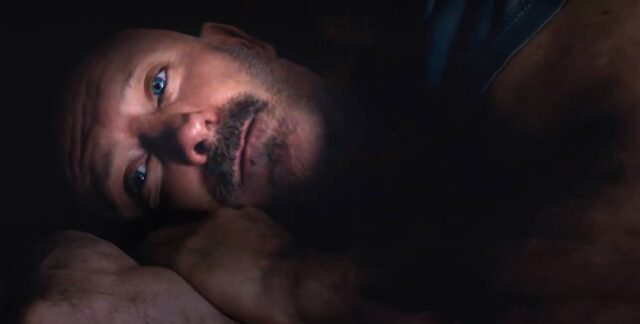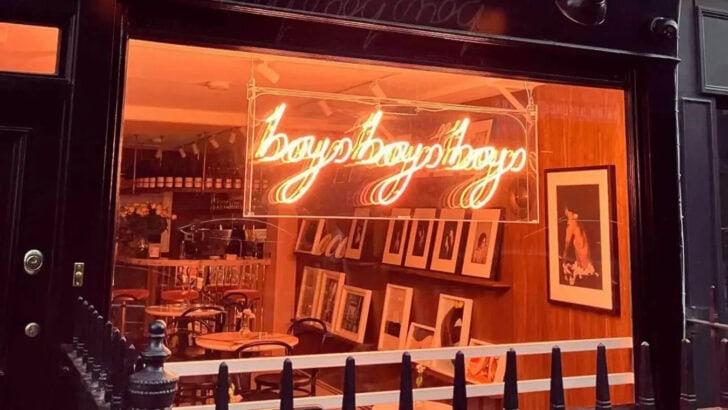QX: What is it you like about Tennyson’s poem The Lady of Shalott?
GW: I first read the poem at university. I was intrigued by the central character who lives in a tower with a curse upon her. She can only see what’s going on outside by looking in a mirror and she has to sit there all day and all night weaving a tapestry that depicts the world outside: a world she can observe, but not partake of. Then, one day, she sees Sir Lancelot, falls in love and decides to leave the tower.
I always wondered what Tennyson is trying to tell us. Is it a poem about servitude, about sexuality, or about destiny and agency? And is it really possible to fall so deeply in love with someone so quickly that you would risk your life to be with them?

So what made you write a queer adaptation of it for the theatre?
This started back in November 2015 when I was alone learning a script for a BBC drama. It was getting late, and I needed a break, so I went on Grindr to see if there was anyone around for a chat.
I started talking to this fella who seemed quite charming, but refused to show me any photos. As we all know, there are various reasons why people do this – they might be married, they might think they’re ugly, they might be famous or they might not be out. I wasn’t sure whether to trust him so I politely ended the conversation and went back to my work.
An hour later, I noticed he had left some more messages for me, suggesting that I should go and meet him at his office. He said he was working very late into the night. He wanted me to go there and take all my clothes off, flex my muscles and then get dressed and go home. I said it was a lovely idea, but again, I politely declined.
Then he offered me £1000, which changed my thinking somewhat!
I said, “Let me get this right: You want me to come to your office, take all my clothes off, flex my muscles and then get dressed again. And you’re going to stay sitting behind your desk and not come anywhere near me, and then you’ll give me £1000 in an envelope?’
“Yes, that’s right,” he said.
Now, I’d never done anything like this before, but I couldn’t think of a good reason not to do it. There was no risk (I’m 6ft 3” and I can handle myself) and no capital outlay (apart from the bus fare), and at an hourly rate, £1000 is pretty good by anyone’s standards.
So I agreed. He gave me the address. It was a small hospital up in the woods on the hillside. I assumed he was a senior consultant doing some late-night paperwork.
When I arrived, it was dark and very foggy (I think it might even have been Guy Fawkes night because I could smell sulphur in the air), and the place looked deserted. He told me to walk straight past reception and turn left down a long corridor.
I asked him to come and meet me, but he told me to relax and just follow his instructions.
There were speakers along the corridor playing some tinny Europop, and a broken exit sign was flickering on and off. It could easily have been the set of a David Lynch film. I was quite nervous, and I could feel my heart beating in my chest, but I thought of the money and kept going.
The corridor was so long you couldn’t see the end of it. But he told me to keep walking past Departments A and B and C etc and carry on down towards the middle of the alphabet. When I got to F, two nurses came towards me and I panicked. I hid in a doorway and waited for them to go past. I kept very still, not even daring to breathe. There was a rhythmic mechanical noise inches away from my hiding place, and then it dawned on me that I was on a ward full of people on ventilators.
I remember thinking, “I shouldn’t really be here”. In fact, I wasn’t at all sure about the protocol for wandering around a hospital in the middle of the night, but because I was the guest of a senior consultant and I had the online conversation to prove it, I thought it must be okay.
When the coast was clear, I continued along the corridor, again, following the instructions of the consultant, and again, pleading with him to come and meet me. Instead, I was told to go up the stairwell to the second floor and along another corridor. But once I reached the top, I had to hide again – this time behind some laundry baskets to avoid being seen by some nurses with lanyards and clipboards.
Eventually, I told him that this was getting silly and he would have to come and meet me, otherwise I would go home. He told me to calm down and then started to suggest some changes to our little arrangement. He requested some adaptations that needless to say were over and above our agreed ‘contract’. Of course, I refused to accommodate these and told him he’d better bloody well come and meet me and he had better bloody well stick to our original agreement and make sure he had £1000 handy in cash.
Then suddenly, he blocked me!
And the entire conversation simply vanished into the digital ether.
I was now completely alone, and deep inside a labyrinthine hospital in the woods at 1:30am, with no permission, and no evidence to back up my version of events. Blind panic took over. Could I remember the way out? Would I be able to get out without being seen? Could I be arrested for trespassing? I started breathing deeply to try and moderate my anxiety and began retracing my steps in order to get out. I made it back down to the long corridor, had to hide once more in the ventilation ward (silently apologising to all the patients for my intrusion) but then made it out through reception without being challenged, and was eventually back on the bus in a state of shock.
Only then did it dawn on me that I’d been deceived. Who was the man? Perhaps he wasn’t a senior consultant at all? Maybe just a patient who was bored and lying awake at night, creating some mischief to pass the time. I questioned my own wisdom, and the ease with which I had been duped. But I also couldn’t help admiring the gall of this stranger, who, in using the internet as cover, pretended to be someone else, and under the guise of a fairly thin backstory, was able to manipulate a rather naive and unsuspecting person on the outside, totally controlling my behaviour. It was genius.
And how did this event lead to you writing the script?
The next day, I began to write an account of what had happened to try and understand it, and it seemed more interesting to write it from his perspective: someone alone in the middle of the night, in some kind of control tower, perhaps being held against their will, pulling manipulative levers to direct the behaviour of people on the outside.
And as I thought about this lonely, cloistered figure, The Lady of Shalott naturally crept back into my mind, and I started to consider the parallels.
I went back to the poem and started to think about some of the characters outside the tower, for example, the reaper, the page and the shepherd. I thought, if the Lady of Shalott could communicate with any of these characters using the Internet, there would be nothing to stop her from assuming a different persona with each one of them – and thereby controlling them in different ways.
Instead of seeing the world through a mirror, she might even use an iPad. She still has to weave what she sees outside, but now this becomes part of a strange monitoring and recording process – a bit like security guards watching CCTV. And like the stranger in the hospital, I decided to make the protagonist a gay man, and explore these events through a ‘neuroqueer’ lens. I’ve called him Martuni.
What would you like audiences to take away from watching the play?
Public reaction will be quite variable, depending on the disposition of each audience member. Some people will respond to the exploration of neuro-diversity and the absurdity of contemporary queer life. Other people might look at the bigger picture concerning the environmental and political collapse that’s going on outside and our own engagement with it. I also expect many people will be familiar with the original poem and will be interested (perhaps outraged!) to see what we’ve done with it.
It’s a peculiar play, to be honest, and I hope it will resonate with people as if they’ve just woken up from a strange dream. On a more fundamental level, I really hope they enjoy it, and it makes them laugh.
Tickets for The Gentleman Of Shalott are from £10: https://www.thehopetheatre.com/productions/the-gentleman-of-shalott/
The Gentleman Of Shalott is at Hope Theatre from 6 – 17 February, Above Hope and Anchor Pub, 207 Upper Street, Islington, London N1 1RL, United Kingdom.



















